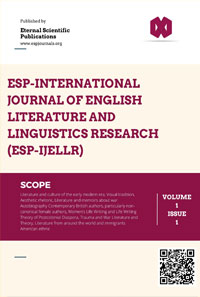ESP International Journal of English Literature and Linguistics Research (ESP-IJELLR)
Citation :
Harihara sudhan, Sanjaykumar, 2025. "Trauma and War Literature: Representation and Narrative Strategies in 20th-Century Authors" ESP-International Journal of English Literature and Linguistics Research (ESP- IJELLR) Volume 3, Issue 2: 42-49.
Abstract :
I have mentioned the World Wars, colonial wars, genocides and civil war as distinct historical social, political and military upheavals in the twentieth century. The extremity of this violence left individuals and communities scarred, in such a way that their trauma required the creation of new modes of representation. In literature, writers were able to explore, explain and describe the obscurities of violence and war upon both society and human consciousness. This essay studies the representation of trauma in 20th-century war literature, highlighting narrative strategies deployed by authors to depict the social, affective and psychological nature of suffering. An important aspect that informs, or is present in the background, of the novel is an understanding of how trauma disrupts conventional narrative forms – memory breaks down; time does not behave in a linear manner; and the survivor’s voice often comes to us mediated through complex acts of storytelling such as multiple points-of-view, silence and unreliable narration. The Ways That Scars Fill: The Intersection Of Form And Content (classic works as examples are taken from a diverse range: Toni Morrison, Herta Muller, Leslie Marmon Silko, Paul Fussell and Gayl Jones) To show how the pain of individual people is inseparable from historical forces, the issue highlights the way in which war writing negotiates between personal and collective memory. It also examines how gender, identity and social marginalization influence trauma representation, demonstrating that storytelling can either reify or defy societal norms. This study illuminates literature’s capacity to articulate experiences that often elude conventional language by charting the progression of trauma narratives in the 20th century. Finally, the work suggests that trauma writing and war writing of the twentieth century has a different function from truth versus rumor: it is ethical and sympathetic, as well as historical in documenting events, assuring understanding, remembering what once happened, thinking critically about the human costs of going to war. Incorporating readers into a performative process of bearing witness, remembering, and interpreting trauma through the use of narrative artifice and thematic complexity, these texts participate in ongoing academic debates surrounding memory, history, and the capacity for storytelling to represent while refusing complacency in the face of oppression.
References :
[1] Caruth, C. (1996). Unclaimed Experience: Trauma, Narrative, and History. Johns Hopkins University Press.
[2] LaCapra, D. (2001). Writing History, Writing Trauma. Johns Hopkins University Press.
[3] Freud, S. (1920). Beyond the Pleasure Principle. Vienna: International Psychoanalytic Press.
[4] Fussell, P. (1975). The Great War and Modern Memory. Oxford University Press.
[5] Morrison, T. (1987). Beloved. Alfred A. Knopf.
[6] Jones, G. (1975). Corregidora. William Morrow & Company.
[7] Silko, L. M. (1977). Ceremony. Viking Press.
[8] Müller, H. (1994). The Land of Green Plums. Henry Holt & Company.
[9] Smith, H. Z. (1930). Not So Quiet: Stepdaughters of War. London: G. P. Putnam’s Sons.
[10] Anderson, L. H. (1999). Speak. Farrar, Straus and Giroux.
[11] Caruth, C. (1995). Trauma: Explorations in Memory. Johns Hopkins University Press.
[12] LaCapra, D. (1994). History and Memory after Auschwitz. Cornell University Press.
[13] Fussell, P. (1980). Abroad: British Literary Responses to War. Oxford University Press.
[14] Hartman, S. (1997). Scenes of Subjection: Terror, Slavery, and Self-Making in Nineteenth-Century America. Oxford University Press.
[15] Whitehead, A. (2016). Underground Railroad. Doubleday.
[16] Winter, J. (1995). Sites of Memory, Sites of Mourning: The Great War in European Cultural History. Cambridge University Press.
[17] Herman, J. L. (1992). Trauma and Recovery. Basic Books.
[18] PagePlace, J. (2012). Trauma in Contemporary Literature. Routledge.
[19] LaCapra, D. (2009). History in Transit: Experience, Identity, Critical Theory. Cornell University Press.
[20] Caruth, C. (2011). Listening to Trauma: Conversations with Survivors. Johns Hopkins University Press.
Keywords :
Collective Trauma, Gender, Identity, Postcolonial Literature, War Literature, 20th-Century Literature, Memory, Fragmentation Nonlinear Narrative Unreliable Narrator.


 :10.56472/25842773/IJELLR-V3I2P106
:10.56472/25842773/IJELLR-V3I2P106